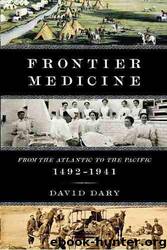Frontier Medicine: From the Atlantic to the Pacific, 1492-1941 by David Dary

Author:David Dary [Dary, David]
Language: eng
Format: epub
Tags: State & Local, CO, West (AK, UT, Medical, ID, United States, MT, HI, NV, CA, WY), History
ISBN: 9780307263452
Publisher: Random House Digital, Inc.
Published: 2008-11-04T16:34:25+00:00
A drawing of an Allis Ether Inhaler being used on a patient. Invented by Oscar H. Allis (1836–1931) in Philadelphia in 1874, it became a popular means of administering ether during operations. The device contained an artificial sponge that absorbed the ether administered from the dropper. (Courtesy National Library of Medicine)
In the early years of the great cattle drives, most cowboys had to be their own doctors. Jack Bailey, who trailed a herd of cattle north from Texas in 1868, kept a journal in which he noted that the pain in his side was due to pleurisy. He also complained about rheumatism and treated himself for fever and pneumonia. He wrote that he suffered diarrhea on two occasions, once after eating the meat of a badly boiled yearling, and again after consuming too many wild berries he had picked. On September 22, 1868, he wrote: “I am sick to day. You bet I would like to be at home. My side and shoulder kept me awake all night. I took some pills last night, which operated finely. Hope I will be better when they work off.”19
By 1870, as trail-driving became more organized, the cook usually carried medicine in the chuck wagon and treated cowboys for cuts and bruises, common illnesses such as an upset stomach, constipation, and diarrhea, or for an occasional broken bone. Such simpler medical problems were usually treated successfully on the trail drives, but the daily hardships of cowboying—sleeping under the stars, working long hours in sun or rain, heat or cold, and not eating well—were responsible for numerous more serious—and longer-term—health problems. One cowboy who suffered was James Emmit McCauley, the son of an East Texas farmer, who left home at age fifteen to become a cowboy. He got a job as a horse wrangler on a trail drive to Kansas and for the next fifteen years broke broncs at $5 a head, trailed countless longhorns north, and even punched cattle on a train. When he was almost thirty, his body was so battered and his health so poor that he had to quit cowboying. He was “stove up,” as cowboys described the condition.
McCauley remembered: “I have done as most cowpunchers do after they have got too stove up to ride. For a man to be stove up at thirty may sound strange to some people, but many a cowboy has been so bunged up that he has to quit riding that early in life. Now at thirty I went back to my early raising.” McCauley, with less than $500 that he had saved, got married and bought 320 acres of land in Texas and returned to farming. “All I got out of cowpunching is the experience. I paid a good price for that. I wouldn’t take anything for what I have saw but I wouldn’t care to travel the same road again, and my advice to any young man or boy is to stay at home and not be a rambler, as it won’t buy you anything.
Download
This site does not store any files on its server. We only index and link to content provided by other sites. Please contact the content providers to delete copyright contents if any and email us, we'll remove relevant links or contents immediately.
| Africa | Americas |
| Arctic & Antarctica | Asia |
| Australia & Oceania | Europe |
| Middle East | Russia |
| United States | World |
| Ancient Civilizations | Military |
| Historical Study & Educational Resources |
Cat's cradle by Kurt Vonnegut(15333)
Pimp by Iceberg Slim(14484)
4 3 2 1: A Novel by Paul Auster(12372)
Underground: A Human History of the Worlds Beneath Our Feet by Will Hunt(12085)
The Radium Girls by Kate Moore(12017)
Wiseguy by Nicholas Pileggi(5769)
The Fire Next Time by James Baldwin(5431)
Perfect Rhythm by Jae(5396)
American History Stories, Volume III (Yesterday's Classics) by Pratt Mara L(5298)
Paper Towns by Green John(5177)
Pale Blue Dot by Carl Sagan(4996)
A Higher Loyalty: Truth, Lies, and Leadership by James Comey(4951)
The Mayflower and the Pilgrims' New World by Nathaniel Philbrick(4487)
The Doomsday Machine by Daniel Ellsberg(4484)
Killers of the Flower Moon: The Osage Murders and the Birth of the FBI by David Grann(4435)
The Sympathizer by Viet Thanh Nguyen(4384)
Too Much and Not the Mood by Durga Chew-Bose(4337)
The Borden Murders by Sarah Miller(4312)
Sticky Fingers by Joe Hagan(4188)
